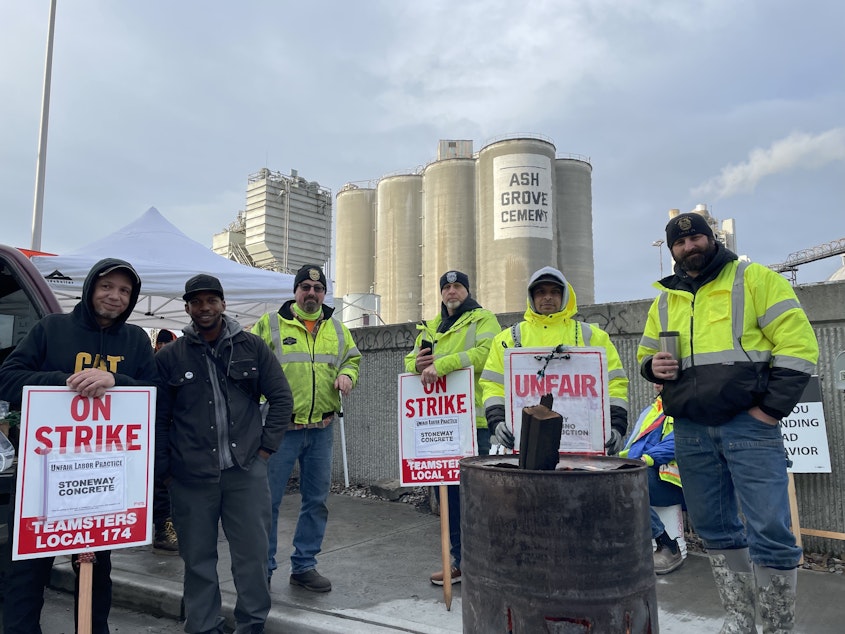Major projects at a standstill as concrete workers strike across King County

Edward Venning has been a cement worker for 17 years. He says he’s still learning the job.
“A lot of times you start early in the morning, midnight, three in the morning — 12 hour days, just to build a city," Venning said. "We’re building the city – city isn’t getting built without concrete.”
But construction at work sites across King County has grinded to a halt as Venning and over 300 other cement workers have joined the picket line to strike against six of the largest cement suppliers in the region. Now, local officials are saying major infrastructure projects across the region could see significant delays, including the West Seattle Bridge Project.
Seattle Mayor Bruce Harrell addressed the dispute in his State of the City speech on Feb. 15.
“I have been clear that business and labor must return to the bargaining table and reach a fair agreement,” Harrell said. “This conflict continues to dangerously escalate in a way that helps no one and hurts everyone.”
But Teamsters Local 174, the union representing the cement workers, and workers themselves have made it clear the dispute won’t end until cement companies provide a stronger offer.
“We’re all out here just fighting for what’s been established in our industry as a base and we want to be met right there. Nothing below that,” cement worker Tim Davis said. “It’s tough for everyone. I know that other people have been laid off, and I feel for them. We want this over as soon as possible. We’re willing to negotiate, we just need the other end to do the same.
Sponsored
Concrete companies state that the package they’re offering the union – which includes a 17.6% pay increase over three years – is “not substandard.”
Soundside reached out to the six concrete companies for comment. A representative speaking on behalf of four of the concrete companies declined an interview, but they did refer the show to statements published on the Associated General Contractors of Washington’s website.
The most recent statement, published February 15, disputes claims that concrete companies have refused to return to the bargaining table.
“This is not a factual statement. The companies have, in fact, bargained in good faith. The Companies maintain the belief that mediation through the Federal Mediation & Conciliation Service allows for an unbiased, disinterested and professional mediator to facilitate a possible resolution.”
The concrete companies assert that they have engaged in negotiations with the Teamsters since July 2021, and the union has repeatedly rejected offers.
Sponsored
Lehigh Cement did not respond to a request for comment, and a representative from the Gary Merlino Construction Company declined to speak on the record.

Development grinds to a halt
Contractors across the region are also feeling the grinding halt to construction the strike has triggered.
Bill Ketcham is the general manager for Turner Construction Company. He says that as the strike continues to stretch into its third month, contractors across the region are seeing a significant impact on the amount of work that’s able to get done at work sites.
Sponsored
“A lot of that, depending on what phase of construction it’s in, is coming to a complete standstill at this point, because we’re not getting concrete to those projects,” Ketcham said.
Turner Construction employs about 350 trade workers in the union. Of those, Ketcham says he’s had to put about 200 people on standby, and will have to add another 25 people to that list by the end of the week due to stalled projects.
Workers on the picket line say they won’t return to their concrete trucks until the involved companies provide a package that includes a deal as good as what other construction trades are getting.
From Ketchum’s perspective, the 17.6% pay increase seems consistent with the other contracts they’ve negotiated with other unions. He supports workers’ rights to bargain, but feels the conversation has dragged on too long – it’s time for people to go back to work.
“They're putting the well being of a lot of a lot of people in the crosshairs," Ketcham said. “Which I feel is a little bit unfair.”
Sponsored
But with an end to this stalemate nowhere in sight, other parties who are caught in the crosshairs will search for alternative ways to get concrete, and Ketcham says that’s already happening.
“There are companies out there leasing trucks, hiring drivers, training drivers to drive these trucks and picking up concrete and delivering them to projects,” Ketcham said. “So there are companies out there who are willing to push the limits and try to test the waters and get concrete because they’re feeling hamstrung.”
Back at the picket line, concrete worker Ron Hills ponders whether his first strike in his 39 year long career will also be his last.
“All we want is, you know, something fair in return. It's not too much to ask," Hills said. “It's kind of heartbreaking. I don't want to retire on their terms. I'd like to retire on my own terms. But if this keeps going I might just say the heck with it. Call it a career.”





